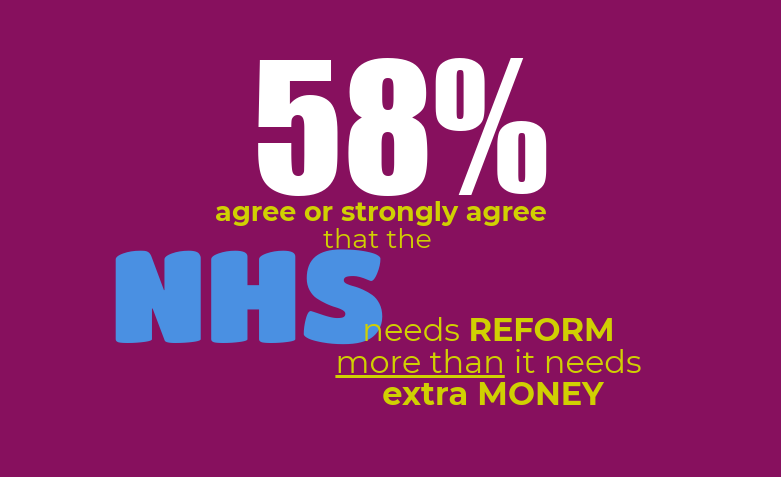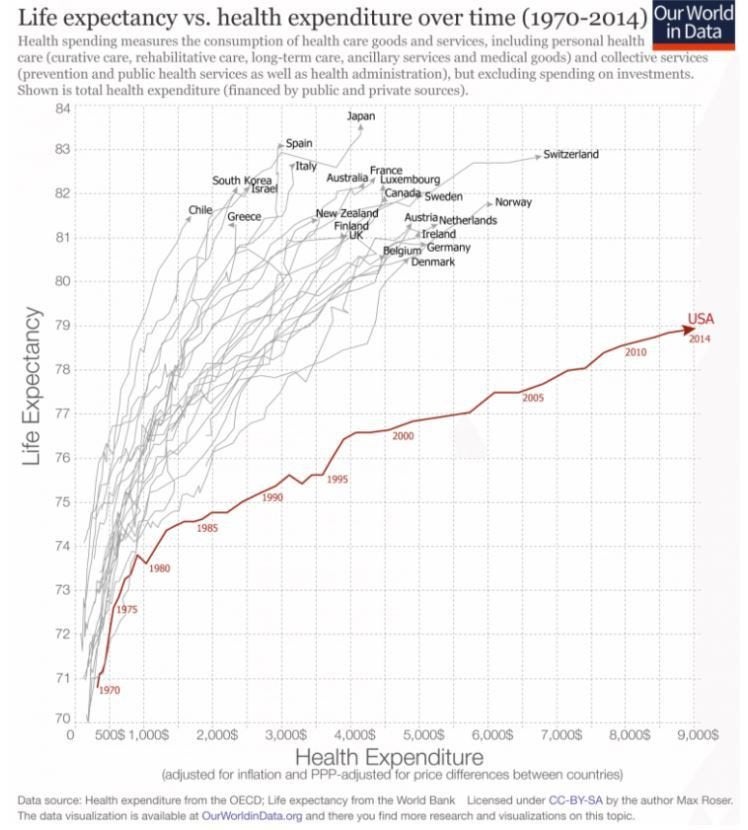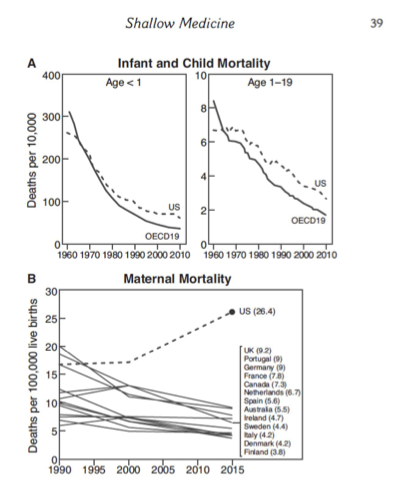
The NHS needs REFORMED.
Indeed, the NHS needs serious overhaul.
It is no longer providing world-class universal care [IMO].
It seems to not even be providing ‘value-for-money’ anymore.
But it is our money and our health, so we must have a say…
🧵1/n
RT pls.
Indeed, the NHS needs serious overhaul.
It is no longer providing world-class universal care [IMO].
It seems to not even be providing ‘value-for-money’ anymore.
But it is our money and our health, so we must have a say…
🧵1/n
RT pls.

The NHS once provided the most cost-effective healthcare of all developed nations. Indeed despite consistently spending the LOWEST percentage of GDP (national income) of similar nations (graph), up until the last couple of decades it still provided world-class outcomes. 

In the 70s the UK had one of the lowest infant-mortality rates in the world. But by 2010 it looked like this (source BBC):
news.bbc.co.uk/1/hi/health/86…
news.bbc.co.uk/1/hi/health/86…

And why are there so many more managers?
As the NHS has been broken up into smaller pieces, the number of managers have increased substantially. Since 1999 the number of managers in the NHS have increased by 82%, while other staff by only 35% (Kings Fund).
As the NHS has been broken up into smaller pieces, the number of managers have increased substantially. Since 1999 the number of managers in the NHS have increased by 82%, while other staff by only 35% (Kings Fund).

While it would be simple to blame the NHS model of care and replace it, and this may be what is required, its important to ask what changed and what has caused the decline of the NHS. And it is this question we should be asking of our leaders?
Why is the NHS failing?
Why is the NHS failing?
Certainly the redistribution of NHS resources to managers and contractors is unlikely to have helped. Almost one quarter (£26bn) of the NHS budget has been given to non-NHS providers and 14% is being spent on managers (vs. 5% in the 1980s). Less and less money for actual care.
And why?
Because we are not pursuing a REFORM of our health service based on what is in the interest of the public. Instead it is being driven by what is good for those providing the service! And where is this leading….
Because we are not pursuing a REFORM of our health service based on what is in the interest of the public. Instead it is being driven by what is good for those providing the service! And where is this leading….
..a diminished primary care service.
GPs have no income from the specialist care they refer to (at the moment), hence they will decide based on safety and efficacy. As such GPs are the gatekeepers and can be the most powerful force against more expensive care.
GPs have no income from the specialist care they refer to (at the moment), hence they will decide based on safety and efficacy. As such GPs are the gatekeepers and can be the most powerful force against more expensive care.

Instead of seeing a GP and them deciding what you need, automated systems (such as '111') are being implemented in the UK. These computer systems will decide who you will see and how urgently. The evidence strongly suggests these systems pose a significant risk to the public.
Chronic conditions are being neglected. Elderly care, mental health services, and acute care are all being diminished. If this continues we will spend twice as much on healthcare and achieve worse outcomes: 

The reforming of the NHS is needed. But it must be open and transparent. Simply being disappointed and annoyed that the NHS is ‘no-longer working’ or has ‘too many managers’ IS NOT GOOD ENOUGH. These changes will affect us all and future generations.
In the ‘70s it would have been difficult to find a better health system - in terms of value for money and good health outcomes. The UK was then, in terms of healthcare provision, truly ‘world beating’.
Since 1980 the NHS has declined. Standards of care have improved, like most countries. Treatments have also improved. But timely access to such treatments have become increasingly poor.
It is telling that:
1. This 'reform' of the NHS is all being done covertly.
2. Many docs and nurses don’t want it - even though they will be paid MUCH better.
3. The public are not getting a say in what model of care they want.
1. This 'reform' of the NHS is all being done covertly.
2. Many docs and nurses don’t want it - even though they will be paid MUCH better.
3. The public are not getting a say in what model of care they want.
I am sorry to put this on you. It is terrifying. And if almost feels like we have no power to change it. Really, those looking after the NHS and our MPs should be protecting us from such backdoor dealings. They aren’t. So we all must stand up for our right to choose.
We may choose a mixed-model of care, where private augments national health, or we may choose to renationalise, or something completely different. But it must be our choice and benefit the people.
So what to do…
Firstly, ask the questions to your MPs. Do they know what is going on? And if so, what are they doing about it?
Secondly, demand open and transparent reform. We want to contribute our opinions to what type of healthcare we will be paying for.
Firstly, ask the questions to your MPs. Do they know what is going on? And if so, what are they doing about it?
Secondly, demand open and transparent reform. We want to contribute our opinions to what type of healthcare we will be paying for.
Finally, follow and support those speaking out:
@NHSMillion, @YourNHS2021, @EveryDoctorUK, @drbobgill @ElGingihy @doctor_oxford @davidschneider @guardian @mattprescott @PeterStefanovi2 @theAliceRoberts @TheDA_UK @CNagpaul @dgurdasani1 @trishgreenhalgh ...+ others you will find.
@NHSMillion, @YourNHS2021, @EveryDoctorUK, @drbobgill @ElGingihy @doctor_oxford @davidschneider @guardian @mattprescott @PeterStefanovi2 @theAliceRoberts @TheDA_UK @CNagpaul @dgurdasani1 @trishgreenhalgh ...+ others you will find.
• • •
Missing some Tweet in this thread? You can try to
force a refresh








